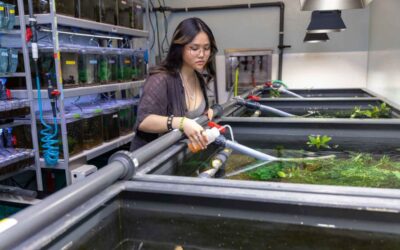Researchers from the Cornell Lab of Ornithology and the Institute for Computational Sustainability are using big data and AI to model hidden patterns in nature – not just for one bird species, but for entire ecological communities across continents.
Cornell AI News
News Category
Filter by Topic
When needs compete, love trumps thirst
Researchers tracked the brain’s dopamine reward system and found – for the first time – this system flexibly retunes toward the most important goal when faced with multiple competing needs.
Cisco Research, Cornell Bowers CIS announce partnership
Cisco Research is providing funding for six research projects that will further the college’s leadership in AI and point the way toward innovative solutions to challenges surrounding the use and development of AI models
NIH funds cross-campus effort to train experts in AI and nutrition
Faculty offered guidance for teaching in the age of ChatGPT
A university committee has released recommendations for how faculty can take generative artificial intelligence into account when considering learning objectives for their students.
9 receive 2023 Bowers CIS-LinkedIn grants
This second round of grants from the five-year, multimillion-dollar partnership will fund high-impact research on topics ranging from large language models and recommender systems to dynamic information retrieval and algorithmic fairness.
Undergrads relish challenging Nexus Scholar research projects
Nexus Scholars spent eight weeks this summer working with researchers on campus on projects in the humanities, social sciences and physical sciences.
Machine learning enhances X-ray imaging of nanotextures
Cornell researchers have revealed the intricate nanotextures in thin-film materials, offering scientists a new, streamlined approach to analyzing potential candidates for quantum computing and microelectronics, among other applications.








